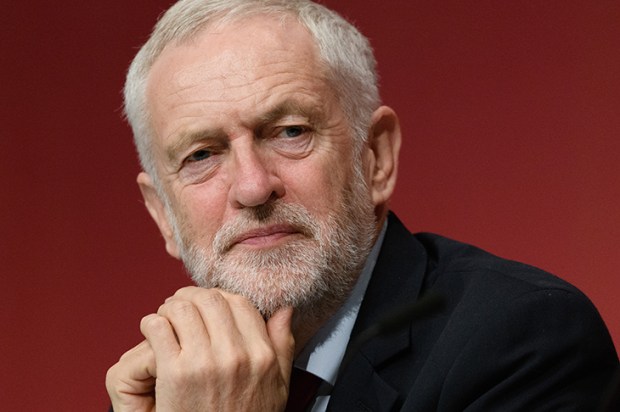‘If he can’t be in politics,’ the Archbishop of Canterbury tweeted last week after Tim Farron resigned the leadership of his party, ‘media & politicians have questions.’
So prelates now think complex theological concerns can be despatched within the Twitter limit of 140 characters. They cannot. Let me now unpack Dr Welby’s abbreviated consideration of this subject and examine what’s behind it, because the subject is of profound importance —and not only for Christians.
Nobody has said Mr Farron can’t be in politics. He has been returned as MP for Westmorland and Lonsdale with the support of 26,686 voters. Farron himself, however, has doubted he should be leader of a party with a long and prominent tradition of supporting homosexual equality and the rights of women to terminate a pregnancy, while continuing to believe that these are sins in the eyes of God.
His doubts are understandable. It’s just a pity that he — and, by implication, the Archbishop of Canterbury — should have couched them in the suggestion that he has been victimised for his faith. After millennia of persecuting other people for their lack of faith, wrong kind of faith, or apostasy, the Church has recently taken to complaining that because some of its teachings are now widely regarded as silly or wrong, Christians themselves are being persecuted. They are not. They’re being judged silly and wrong. They are getting the electorate’s cold shoulder. They remain free to test their beliefs in any election they choose. The rest of us remain free not to vote for them. Nobody is victimising anybody.
But Mr Farron was also raising a more interesting question. An amused Lord Melbourne, Queen Victoria’s first prime minister, and a Whig as it happens, put it in his characteristic cheeky style when he observed that ‘things have come to a pretty pass when religion is allowed to invade public life’. And before you agree, take note that Melbourne was objecting to William Wilberforce’s using Christianity as an argument against slavery. Many, though, will sympathise with Lord M. There exists a comfortable English idea that religion is private and politics public and so long as the boundary is respected, they can live side-by-side. But no reading of the Gospels (or Quran) can sustain this idea. Beliefs about the purpose of human existence and the divine authority for its rules cannot all be shut in a box marked ‘Faith — private’.
But some can. Which? In the old-fashioned sense of the phrase, Jesus begged the question, offering no guidance as to which things are God’s and which Caesar’s. Since the Farron resignation, there has been much huffing and puffing in the media, and a tendency to take principled stands — ‘yes, politicians’ private beliefs must/mustn’t inform their politics’ — without any recognition that this might not be a question of principle at all, but only of degree. ‘How important is this belief to you and how much might it affect others?’ That is perhaps the only question.
Let me demonstrate. It will be widely felt that when Jeremy Paxman demanded to know why there was nothing in the Labour manifesto about abolishing the monarchy (as Jeremy Corbyn would like), Mr Corbyn’s answer — ‘because we’re not going to do it’ — knocked the question down. But if, say, Mr Paxman had protested that there was nothing in Labour’s manifesto about another of Corbyn’s beliefs, redistributing wealth, then ‘we aren’t going to do it’ would not have been thought a satisfactory answer.
Here are five things a party leader might privately believe:
1) that sex with children is fine
2) that the theory of global warming is false
3) that Darwinian theory is wrong
4) that homosexuality is a sin
5) that marriage is indissoluble in God’s eyes.
This order would be my personal ranking of unacceptability, from most to least. Yours might slightly differ; but there can hardly be a Spectator reader who thinks all five of them must disqualify a person from leading a political party; and there can hardly be a reader who thinks none should. For me it’s around the middle of this list (at Darwin I waver) that I begin to feel able to disregard the belief in a contender for leadership.
When we judge that a belief does disqualify someone from leadership, on what grounds might we say so? One or more of three grounds, I suggest. First, that whatever the candidate may protest, we fear this belief might influence the way they led their party or country.
Second, that to hold such a belief, even if never acted upon, was proof of fundamentally unsound judgment, perhaps in other matters too.
Third, that it would simply be unacceptable that anybody believing this should be awarded the status of leadership. My suspicion is that it is this third, the punitive instinct in us, that’s often the real decider; but that, feeling sheepish about our retributive instincts, we prefer to work up more practical reasons for ruling somebody out.
Translated into Tim Farron’s case, I can make the case for disqualification on all three grounds, but rather weakly. Having a leader who doesn’t himself believe in homosexual equality or a woman’s right to choose might blunt the party’s campaigning edge on such issues; and if he really thinks God condemns gay love, what other crazy ideas might grip him? And anyway I want such people to be punished as they would punish me.
But in just one way I think the more of him for resigning. He’s a man prepared to follow his beliefs and take the consequences. Were he any good as a leader, that would have decided me against his resignation. Such, reader, is the Rubik’s Cube of moral reasoning that a question like this thrusts into our hands. Bully for the Archbishop if he thinks it can be sorted in 140 characters.
Got something to add? Join the discussion and comment below.
Get 10 issues for just $10
Subscribe to The Spectator Australia today for the next 10 magazine issues, plus full online access, for just $10.
You might disagree with half of it, but you’ll enjoy reading all of it. Try your first month for free, then just $2 a week for the remainder of your first year.















Comments
Don't miss out
Join the conversation with other Spectator Australia readers. Subscribe to leave a comment.
SUBSCRIBEAlready a subscriber? Log in